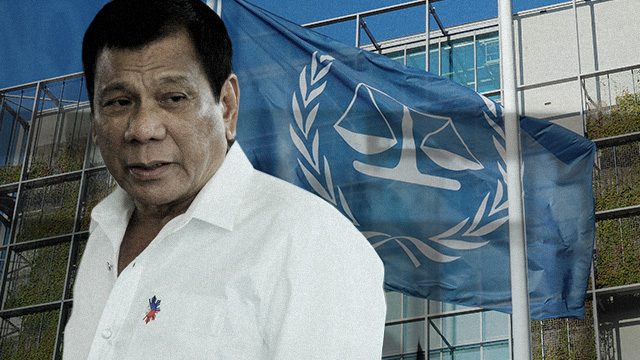SUMMARY
This is AI generated summarization, which may have errors. For context, always refer to the full article.

MANILA, Philippines – While President Duterte is keen on withdrawing the Philippines from the International Criminal Court (ICC) immediately, the court’s role in sustaining the justice system and maintaining checks-and-balances gives reason for the president to reevaluate his decision.
Lawyer Romel Bagares, lead counsel of the Philippine Coalition for the International Criminal Court (PCICC), said that the ICC is not a mere political tool wielded against the President. Instead, Bagares said it “should give the President comfort” because it looks over every detail during investigations. (READ: EXPLAINER: ICC’s track record and what it means for Duterte and the PH)
Bagares cited the acquittal of former Congolese vice president Jean-Pierre Bemba from charges of war crimes and crimes against humanity in June 2018 by the Appeals Chamber of the ICC, after having been convicted in 2016.
“Hindi kangaroo court ang ICC. Malinaw na may independence po itong ICC at sa kasong ito na napakakontrobersyal, actually maraming nag-react negatively sa korte noong lumabas itong desisyon na ito,” Bagares noted.
(The ICC is not a kangaroo court. It is clear that the ICC has independence and for a controversial case such as this, there were actually a lot of people who reacted negatively to the Court when the decision came out.)
The PCICC has filed a petition in June 2018 against the withdrawal. The coalition hopes to consolidate their petition with an earlier one filed by the Senate minority before the Supreme Court (SC) to oblige the Malacañang to cancel the withdrawal.
No bias in ICC
There is no need for apprehension as the ICC does not promote bias, Bagares said. Besides, the Court who will be handling and inspecting the cases filed comes from outside the country, and the case is still undergoing preliminary examination.
Furthermore, the ICC should not be viewed as the “savior of Filipinos”. Instead, it should be taken by the administration as an opportunity to prove its competence in handling and prosecuting criminal cases.
“Ito yung pagkakataon natin para patunayan sa ICC na hindi na kailangan manghimasok kasi ‘yun naman talaga ‘yung disenyo ng tinatawag na complementarity [principle]. ‘Yung mga korte natin ang dapat na mauna na patunayan na kaya natin magprosecute ng mga krimen na ito,” Bagares said.
(This is our chance to prove to the ICC that they do not need to mediate because this has been the initial design of the so-called complementarity [principle]. Our courts should be the first to prove that they can prosecute these crimes.)
The complementarity principle indicates that the ICC only mediates when local courts “[do] not, cannot or [are] unwilling genuinely to do so.” Otherwise, local courts still hold jurisdiction over their cases. Duterte, however, believes that the Philippines was only “made to believe” this principle. (READ: [OPINION] ICC: Complementarity, not exhaustion of remedies)
While there is an ongoing investigation on Tokhang by the SC, it remains unclear whether the judicial system is already working closely on addressing the problem.
Bagares also added that while the government can easily argue that they are working towards proper prosecution, it is still essential to consider the recommendation of the ICC’s Trial Prosecutor, which is to investigate genuinely whether the allegations have zero basis or are politically motivated.
“Mahalagang dapat ‘yon tingnan ng ating pamahalaan at bahagi ng proseso din itong proseso sa Korte Suprema, no. Makikita natin kung ‘yung ating mga kapulisan ay merong cooperation. Makikita din ‘yan sa bilang ng kasong nakafile laban doon sa sinasabi nating may gawa ng Tokhang.” (READ: EXPLAINER: Police, military officials liable for Duterte’s illegal kill orders)
(It is important for the administration to acknowledge it and the SC is also a part of this process. We can see whether our police cooperates. We can also see this in the number of cases filed against those who allegedly conduct Tokhang.)
Strong arguments
The oral arguments by the PCICC, represented by Bagares along with lawyers Ray Paolo Santiago and Gilbert Andres, are set to take place this August 14.
Bagares said that there is an anomaly in the President’s order to void the ratification of the Rome Statute, such that the Senate has filed a resolution approving the country’s membership to the treaty.
“We have this Senate resolution saying that [when] we become a party, it stays there, it’s still law, because the president has no power to invalidate that… it’s a violation of the separation of powers doctrine,” he said.
While the resolution was blocked, the treaty clause still goes back to its provisions under the Constitution that the treaty should pass by the Senate first – hence the petition for at least two-thirds vote before withdrawal.
Moreover, Bagares noted that their ‘strongest arguments’ lie on two points.
On complementarity principle: Bagares said that the Philippine government reserves the obligation to prove that it has a “genuine ability to prosecute.”
The preliminary examination does not necessarily mean that the Office of the Treaty Prosecutor is set on meddling with the Philippines’ local affairs.
On non-publication: Bagares cited the Doctrine of Transformation under the Constitution, which states that international laws can be transformed into a domestic law if it undergoes local legislation.
Bagares also mentioned that the statute has been is enshrined and published under Republic Act No. 9851 or the International Humanitarian Law, Genocides, and Other Crimes Against Humanity, a domestic law.
“We have so many cases saying that we don’t need publication of a treaty as long as it’s concurred by the Senate, that is equivalent to transformation of the treaty into Philippine law. That’s pretty much established in Philippine jurisprudence.” – Rappler.com
Add a comment
How does this make you feel?
There are no comments yet. Add your comment to start the conversation.